How I Paid My Rent Betting on Basketball... Without Knowing the Rules
My Chief Legal Officer / Brother in Law School has told me to tell you that this is not financial advice, I am not a Verified™ Expert™, terms may have changed since I wrote this, you read and act at your own risk. I take no responsibility for anything, anywhere, in perpituity, throughout the universe.
It started, like the Bill of Rights would backwards, with the Tenth Amendment.
(Stop Trying to Teach Me Things and Just Tell Me How to Make Money)
Specifically, with the Supreme Court's 2018 decision that a 1992 federal law outlawing sports betting was unconstitutional. As the high-rolling heart of American gambling, Nevada was grandfathered in under the original law, so for twenty-six years, Super Bowls and World Series, if you wanted to bet on a game, you had to be in Nevada.
Or in reality, as a sports-mad roommate patiently explained, you needed a telephone, and a friend in Nevada. Betting across state lines remains illegal, and has been since the sixties, but according to Jack that does little to deter the networks of underground bookies that will help you do it. In the modern world, this looks like an outgoing morning Venmo marked "Groceries", and a return "Utilities" for twice the amount if the Hornets win that evening. You don't even need a friend in Nevada. Like any self-respecting criminal enterprise, there are foot soldiers in towns across America that'll collect your stake, combine it with twenty others, and then they'll send it over to the heavy hitters in Vegas (presumably these are done over Zelle and marked "Alimony") to place the combined super-bet, with the winnings flowing back down the pyramid accordingly.
I was deeply impressed with Jack's intimate knowledge of the modern mafia. Right up until he revealed his local contact to be "Dirty Dave", the sophomore behind the local deli counter with the perennial "Stoned, or from Oregon?" conundrum hanging like a halo round his beanie. I'm told he has a snappy website, reasonable spreads, and one of the fastest settlement times in the business, so what do I know?
Dirty Dave & co. have had a rough few years, as a wave of legalization has flooded the country in the wake of the Supreme Court decision. Initially it was just in-person betting at casinos, but with lobbyists whispering "If the web servers are in the casino, your laptop (and by extension, you) are basically there already" in one ear, and jingling moneybags marked "51% tax rate on gambling revenue" in the other, states began to legalize online gambling too. First it was Pennsylvania and New Jersey, then Iowa, Indiana and a handful of others, but by 2021 the big fish remained stubbornly at sea.
California demurred. Florida basked in Miami sunshine. Texas, sweet land of liberty, dragged its legislative spurs and focused on its power grid. The people stayed home trading Gamestop, while the betting companies salivated over the mass affluent and their unreachable wallets.
And then that November she came; like money and thunder she blazed into flame.
Fourth in population, third in GDP and first in per-capita GDP, New York legalized online sports betting, and triggered a once-in-forever frenzy for market share in the Empire State.
Blood in the Water
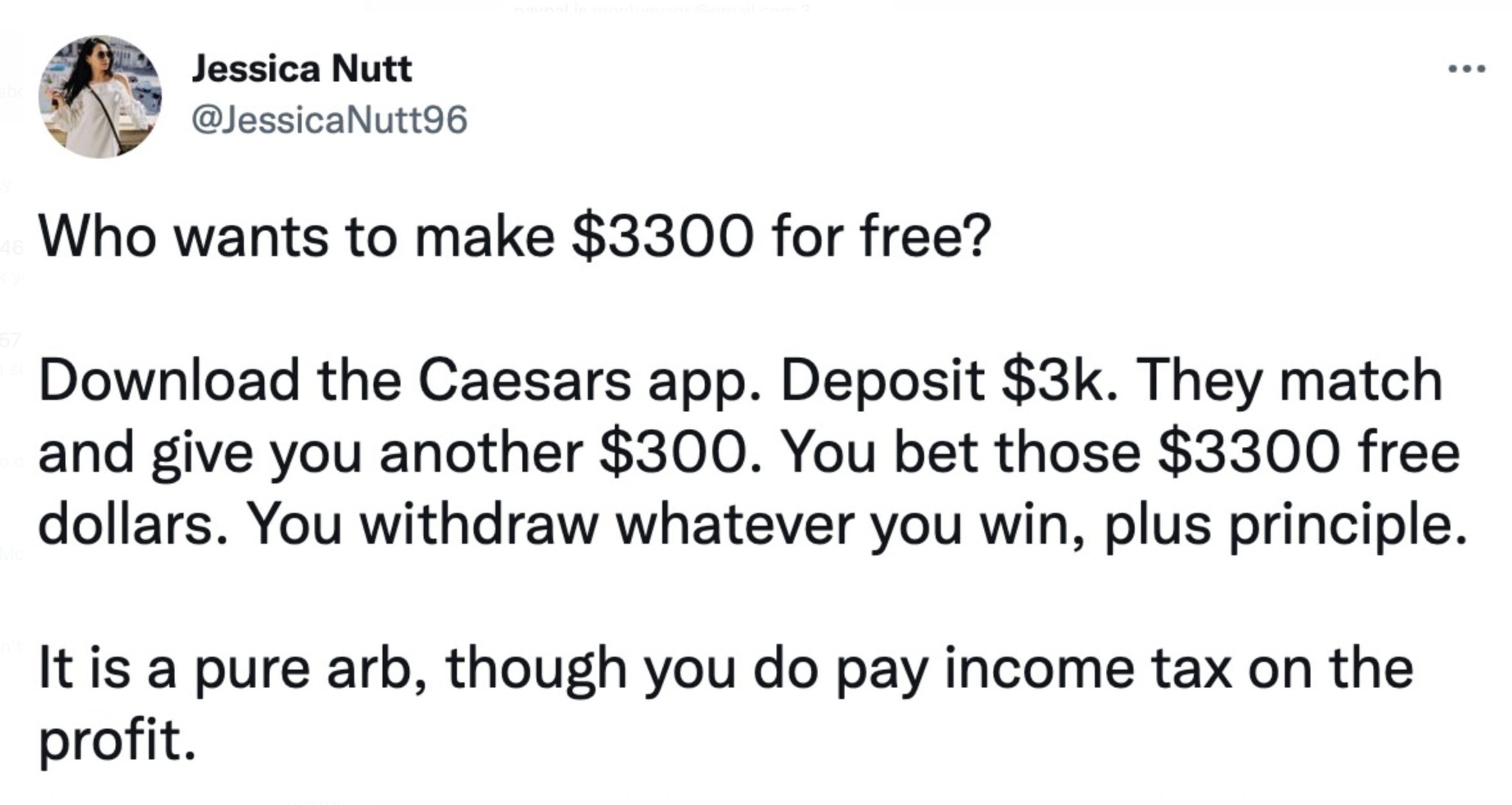
On January 8th, the New York Gambling Commission declared the first four online bookmakers approved for business. On January 18th, my cousin sent me this tweet. She claims that she and her colleagues at J.P. Morgan spend their working hours toiling hard to maintain peace and harmony in the global financial ecosystem, that the rest of us might enjoy our mortgages and pensions in peace. The evidence so far suggests that they actually spend their time cultivating exceedingly sensitive noses for monetary shenanigans. One week she's opening six checking accounts to harvest sign-up bonuses, the next she sends me a referral code for a Lithuanian credit card with 50% cashback on toasters. As sharks to blood and the common mouse to a crumb of Normandie Camembert, so is the first-year analyst to the financial loophole.
This particular shark was in a bind, because she had neither a US address nor a social security number, and so couldn't sign up for the promotion; her younger cousin, away at college across the ocean, had both.
It was, obviously, a scam.
Promises of free money. Large upfront cash requirements and enthusiastic support from internet strangers. All orchestrated by an industry with millennia of expertise separating customers from their wallets. I wandered over to Reddit to confirm my suspicions, but instead found such community stalwarts as u/Lmpbzkt gleefully explaining how they'd turned a $3300 profit in a couple of hours. My mental projection of the "active Redditor" and "experienced sports bettor" intersection looked like Peaky Blinders' Thomas Shelby, with worse hair and better Wifi. The kind of shadowy digital spirit that got banned from after-school computer club for hustling fish dollars in Club Penguin's less reputable igloos.
In reality, these people are not too different from the first-year analysts (I suspect many are the same people): overly online, and possessed of a profound aesthetic appreciation for financial finesse. The comments section abounded with strategies for combining wagers to minimize risk, pro-con analyses of different promo codes, reports of account freezes and strategies for getting around them. People posted their planned bets, and within minutes received detailed feedback correcting their maths, offering alternatives and cheering encouragement.
It was deeply, unexpectedly wholesome. These people weren't scammers. They didn't want my money. They just adored the game.
Beginning to Believe
It sounded like this could, in theory, work; my main reservation was that I'd screw it up. I scoured the Terms & Conditions on the promotion site with the same keen eyes that nailed the SAT Reading section and can reread sentences for minutes without noticing. I wished I'd made friends with more future lawyers; I rewatched the Suits pilot.
I would later discover, when evangelizing to friends, that this is by far the hardest part. Understanding the rules, the gambling terminology, and the best strategies takes thirty minutes. Researching corroborating accounts and figuring out how you're actually going to place the bets: another hour. But overcoming the long-established association of "Gambling" with "Bad, Sleazy, Fast-Track to Alcoholism and Losing My Life Savings" is really difficult.
Nevertheless, comforted by the knowledge that I hate whiskey and intend to marry rich, I cobbled together the money and courage to make the deposit. The bonus $3300 appeared immediately, and we were in business.

Location, Location, Location
Caesars allows you to create an account from anywhere (even gamble-phobic North Carolina), but to use your promotional money you have to be physically present in New York State the moment you place your bet. They make you download a program called GeoLocation that needs to be running on your laptop, and happily reporting that you are in the state you claim, for the website to work. On the mobile app they use the built-in GPS instead. Despite getting a high B- in Computer Networking, my knowledge of internet location skulduggery begins and ends at "VPN." This is apparently hilariously easy to detect, and indeed the site presents you with a condescending pop-up that freezes everything until you stop playing peek-a-boo. I briefly considered consulting Professor Jeffay, but the bloody image of my final exam paper lying cadaver-like in a torrent of red ink on the desk still plastered my mind's eye. Absent any other ideas, I booked a flight to New York.
Whether out of an abundance of love or a fear of traveling alone, I showed my housemates (and the aforementioned Jack) my newfound (still theoretical) wealth, and convinced them to make accounts. One got immediately held up for "Additional Verification", and another was created fine, but didn't show any bonus money after the deposit. A trudge through the online customer service chat revealed that we'd used the wrong promotion link during sign-up, and were ineligible for further bonuses. Housemate Charlie, however, clicked all the right links and verified all the right verifications. We cleared our calendars for the following weekend (this was easy, because they were empty), and booked our flights.
Nuts and Bolts
Among all the promotions from all the gambling companies, the "Deposit Match" is the most straightforward: you make a deposit, and the site will throw in a bonus, up to some cap. Crucially, this bonus comes with a playthrough requirement attached. To understand playthrough requirements (sometimes called rollover requirements), you have to understand that bonus money, however golden and large the dollar sign preceding it, is not real. You cannot withdraw it, you cannot bet with it, you cannot do this with it:
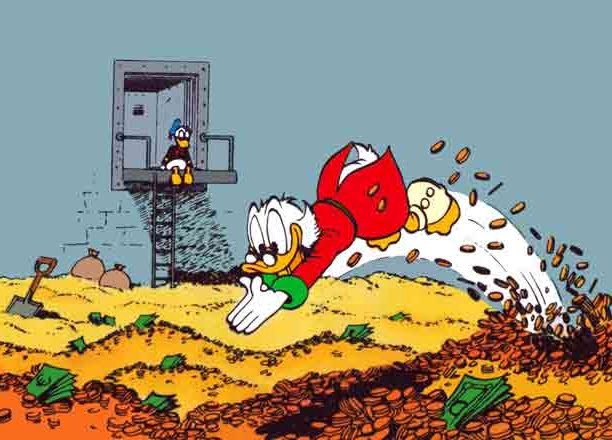
Bonus money becomes real when you make bets (with your real deposited money, since you can't bet bonus money), at a rate determined by the playthrough requirement. Expressed as a multiple of your bonus money (e.g. 1x, 10x, 25x), this is the amount of real money you have to bet before your bonus money converts into cold, hard, withdrawable dollars. This does not happen gradually. When you have met half your playthrough, your bonus money remains entirely unconverted.
In our case, we had a 100% match, up to a cap of $3000, and a 1x playthrough requirement. After our $3000 deposit, we had $3000 cash, $3000 bonus, and a 1 x $3000 = $3000 playthrough requirement to release it. (They actually threw in an additional $300 bonus cash sign-up bonus, but we'll ignore that for now).
Imagine we bet all our cash. In doing so, we meet our playthrough requirement and realize the $3000 bonus as cash. Even if the bet loses, we end up back where we started. If it wins, we scoop up the winnings, and also realize the $3000 bonus cash (the playthrough requirement is entirely indifferent to whether your bets win or lose).
In the simplest scenario (a 50/50, even-money bet where you either lose your money or double it), armed with this promotion the two outcomes are:
- The bet loses, and you neither make nor lose any money.
- The bet wins, and you make $3000 in betting profit and $3000 in bonus-now-real money, for a total $6000 profit.
We didn't realise it at the time, but this $3000 deposit match was highly unusual. The offer was cancelled before we'd even arrived in NYC (but not before we'd made our deposits and secured our bonuses), and Caesars lost almost $70 million in the first half of 2022 through its online sportsbook. This was either a carefully reasoned down-payment on securing long-term customer revenues and retention, or an undercover welfare program run by the marketing team. Outside of Caesars, the highest deposit match around is $250, at BetRivers / PlaySugarHouse. But while I can't give you the raw financial firepower of January 2022's bonuses, I can offer some strategies with which to unpick a subtler web of opportunity.
First, though, we need to understand the other, far more common, form of promotion, and how its siren call leads all but the savviest gambler to her ruin.
How a $1000 Promotion is Worth Negative Money - The Risks of a Risk-Free Bet
On arrival in New York, we discovered that we weren't alone in promotion-fever. From every wall of Penn Station, Jamie Fox stared down at us with dollar signs in his eyes.
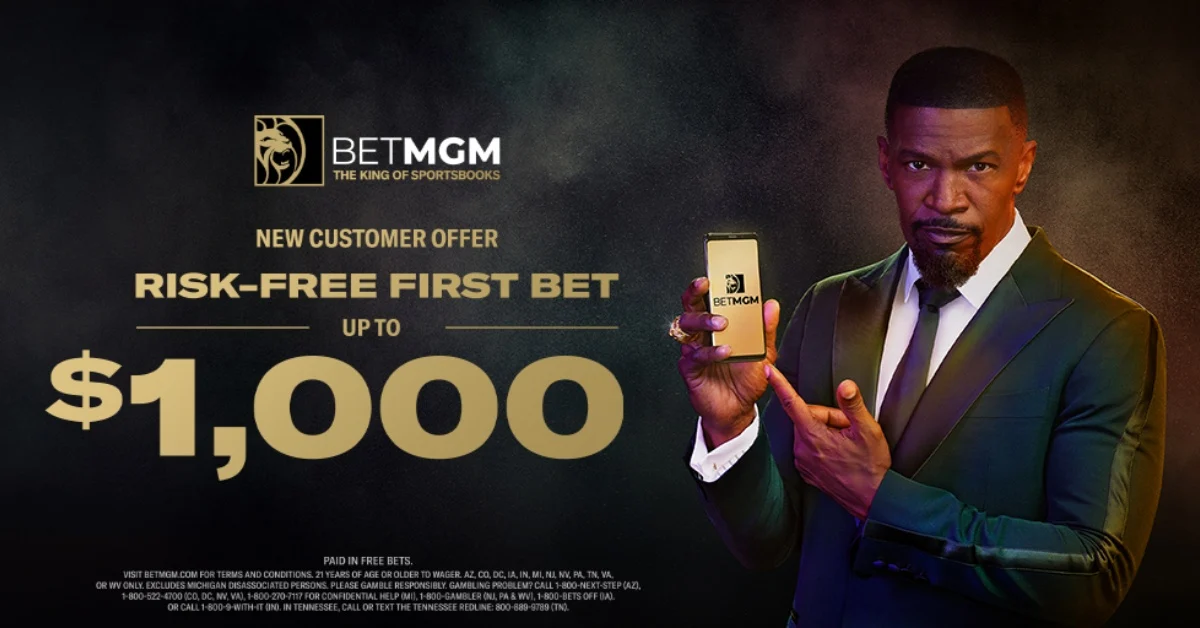
Beneath that fuzzy exterior, however, lies the web of a spider most cunning. The MGM offer is not a deposit match - rather, they offer a "risk-free bet" of up to $1000. This is extremely clever advertising, and extremely untrue.
If you sign up for the promotion, put $1000 in your MGM account, make a bet, and win: you leave with your winnings, no questions asked. If you lose, you receive a free bet token for the value of your bet (up to $1000). A free-bet token sounds like a friendly thing. Tokens evoke memories of childhood funfairs; free is everyone's favourite word. And yet the free-bet token is a fickle friend. Like bonus cash, though it sits next to a dollar-sign on the page, you can't withdraw it. The only thing you can do with a free-bet token is to bet it.
But free bet tokens do not behave like normal money. When you bet money and win, you get your stake back plus some profit. When a free bet token wins, you do not get the stake back. (Actually with some sportsbooks you do, but they are the exception to MGM's rule).
To return to Mr. Fox and friends, if we bet on a coin-toss and lose, we receive a $1000 free-bet token. The evil genius of the promotion is that this looks basically fine, but is actually a much worse position than just having $1000. For one thing, we can't withdraw the token - we have to make a bet with it, and so right away have a 50% of walking away with nothing.
But more deviously, even if our token wins, our payout is only $1000 - we do not also recoup the stake, and are back where we started without making any money at all!
There are three paths we could take through the promotion: Win, Loss -> Win, Loss -> Loss. Each path has a different pot of gold at the end of its rainbow, and a different chance of actually happening. Ultimately we'd like to answer the question "What is this promotion actually worth?". How best to accomplish that?
An intuitive way to value this puddle of probabilities is to average the payouts at the end of each path, weighting by how likely we are to follow them. There's a 50% chance of walking down the Win path, where $2000 awaits. There's a 25% chance each of going down Loss -> Win and Loss -> Loss, which offer $1000 and $0 respectively.
Combining this together, we have: (50% x $2000) + (25% x $1000) + (25% x $0) = $1250
This weighted-by-probability average is called the Expected Value / Expectation / Expected Whatever. It is the most useful, fundamental weapon in the statistics armoury. Unfortunately, most people meet it under a weird-sounding name halfway through a Friday afternoon maths class, compelled at pencil-point to combine random, contextless numbers. They promptly forget it, and while the basic intuition lingers, insufficient sharpening means it is rarely battle-ready when the moment strikes to deploy it.
This is one such moment.
Keeping track of the plethora of paths, payoffs and probabilities is potentially problematic: it can be helpful to draw things out.
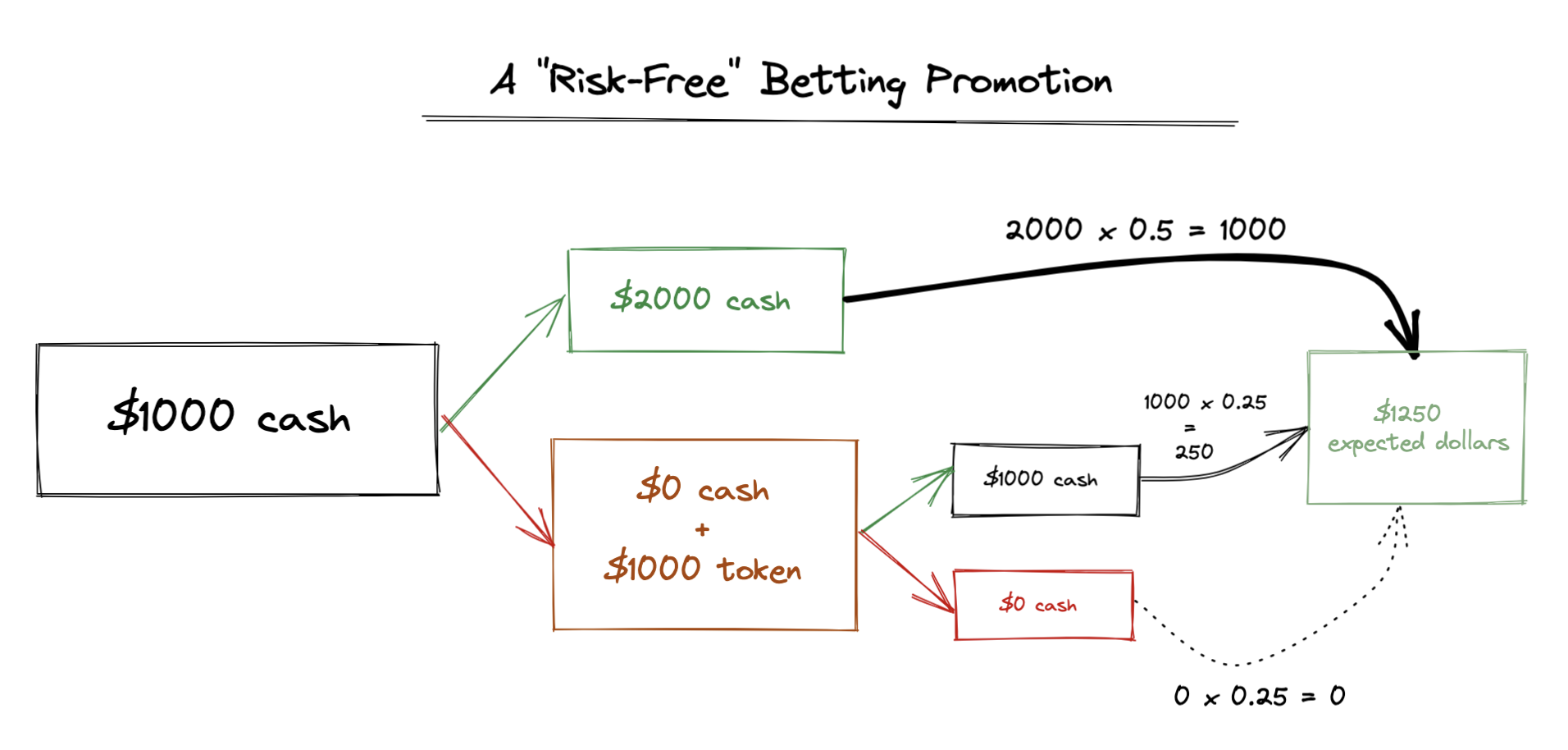
From a certain perspective, the MGM promotion is a way of turning $1000 real dollars into $1250 expected dollars, i.e. it has an expected profit of only $250.
But it gets worse.
Spreads
We have thus far imagined our bets as 50/50 coin tosses, where a win doubles your money. Bets like this are not available in real life, because sites like to make money. The most common way to bet in the US is to "bet the moneyline". It looks like this:
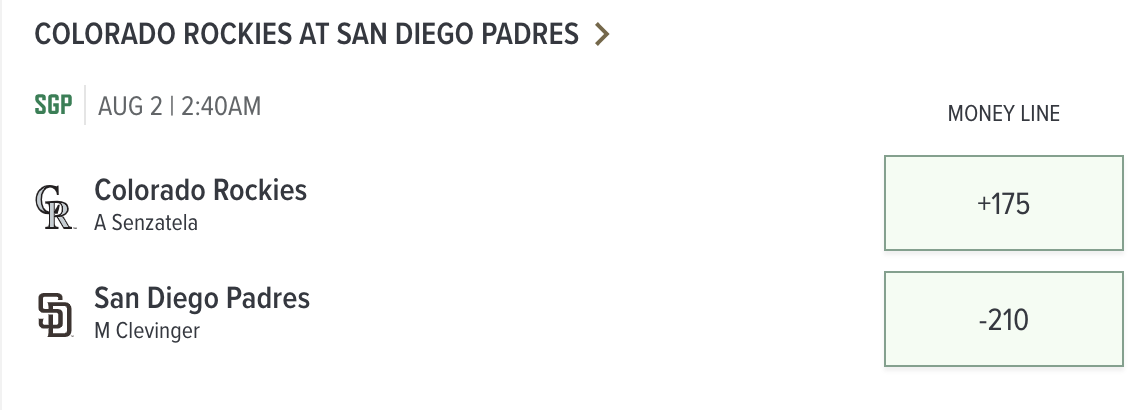
Moneyline odds always have a + or - sign, followed by a number, at least 100. When you see -210, this means: "We think this team is going to win, and if you want to earn $100 when they win, you have to risk $210 for the privilege." Conversely, +175 says: "This team is the underdog: for a stake of just $100, we'll give you $175 dollars if they somehow scrape a win." Notice how, in a fair and just world, the two numbers (ignoring the sign) should be the same: The losers' stakes simply become the winners' profits.
With actual money lines, if the Rockies win, Caesars only sends $175 dollars per Padre to each Rocky: leaving them $210 - $175 = $35 per Padre. If 10,000 Padres fans bet on the game, this is highly lucrative! This difference between the money lines is called the "spread", and it is how betting sites make money.
Caesars actually offers us three main types of bet on this game:
 (They also offer a thousand other, increasingly ridiculous bets, like "Will Yonathan Daza hit the ball more than twice, before being caught out, by a less than twice-divorced outfielder with Central American ancestry?")
(They also offer a thousand other, increasingly ridiculous bets, like "Will Yonathan Daza hit the ball more than twice, before being caught out, by a less than twice-divorced outfielder with Central American ancestry?")
A Run Line bet is a way of saying: Yes, obviously the Padres are going to win, but by how much? If they win by more than 1.5 (i.e. by two or more), then the lower Run Line bet succeeds. If the Rockies lose by less than 1.5 (or actually win the game: if you tilt your head, winning by 3 looks a lot like losing by negative 3), the upper Run Line bet succeeds.
Offering +1.5 / -1.5 conveniently sidesteps the issue of what happens when a team wins by exactly 1.5, because you can't score half a run. If you do see a Run Line bet with whole numbers and the score exactly matches the run line, the bets are simply voided. This is very annoying if you used a free bet credit, because you do not get it back: whole-numbered run lines should be avoided when playing with promotions.
The Total Runs bet has nothing to do with which team wins. The Over 7.5 / Under 7.5 bets unhelpfully each line up with a team: this is just a formatting quirk. Instead, they win when more than 7.5 / less than 7.5 total runs are scored in the entire game, regardless of who scores them.
Let's take another look at the Total Runs odds: they are both -110. Negative odds denote the favourite outcome: how can two mutually exclusive outcomes both be favoured to happen?
Caesar's actually believes that each event is equally likely: it is a coin-toss whether the game has more / fewer than 7.5 runs. But unlike our coin-tosses earlier, a win won't double your money: if you want to win $100, you have to stake $110. Whatever the result, $100 moves from each loser to each winner, and Caesar's pockets the remaining $10.
If we return to the promotion, and place $1000 on one of these -110 coin-flips, a win won't double our money. For each $110 we wager, we win $100; we've wagered 1000 / 110 = 9.09 lots of $110, so we'll take home $909 profit, or a $1909 payout when we include our stake.
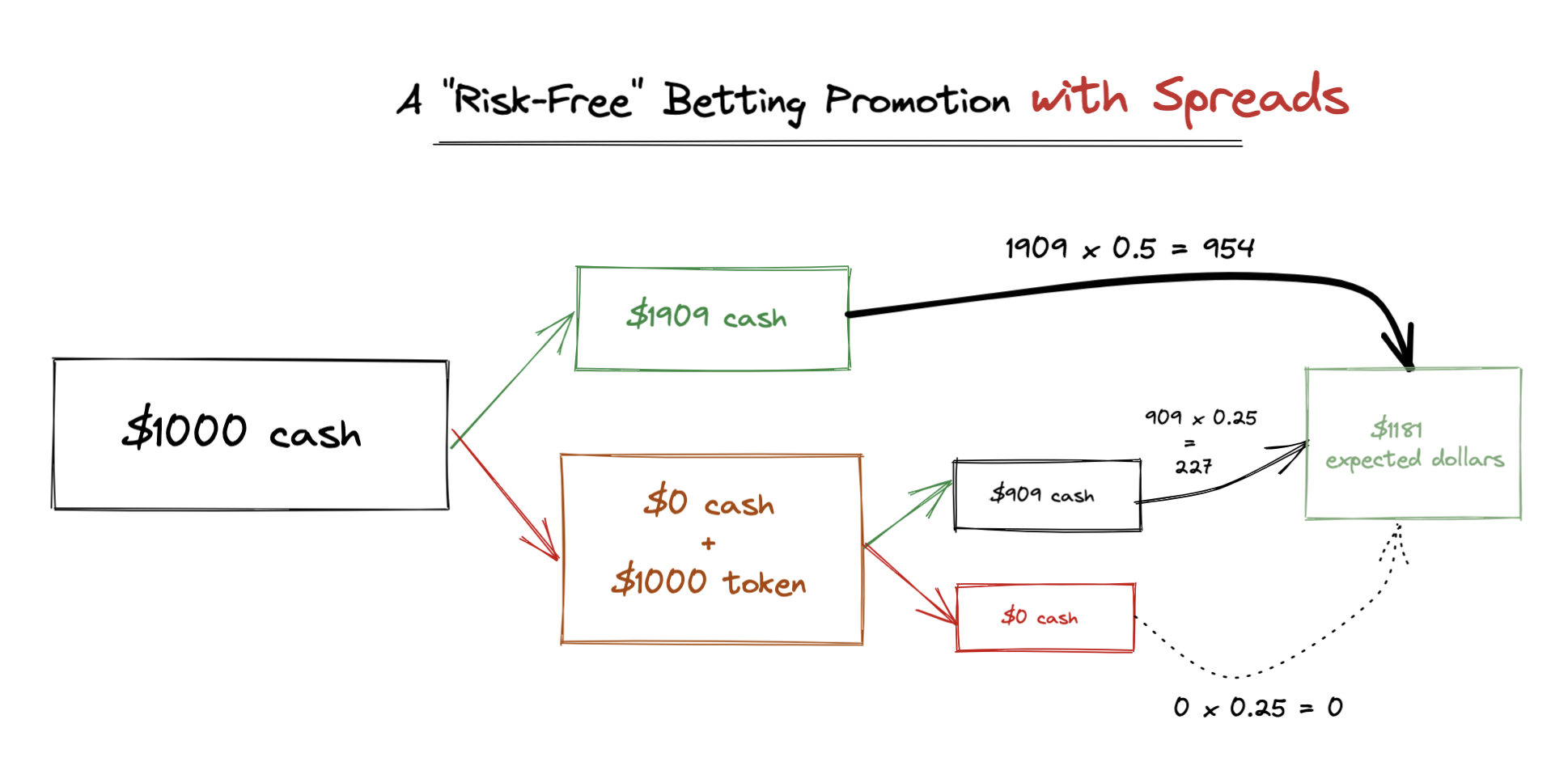
Taking spreads into account, the promotion now gives us $181 expected dollars, rather than our earlier $250.
It gets worse.
Risk Aversion
Even if we ignore the spread, would you actually bet $100 on a coin flip? A 50% shot at winning $100 and a 50% shot at losing it? Most people have an intuitive sense that the expected profit is zero, and wouldn't bother. But what if I offered you $120 dollars if you won?
For most people, the answer is still no: losing $100 somehow feels worse than making $120: an even chance at either isn't worth it. This general sense is called risk-aversion: it often feels more bad to lose something than it feels good to gain it.
Not everyone feels this all the time. The gambling industry is predicated on people enjoying the thrill of the occasional win enough to keep them playing through their losses, despite losing money in aggregate. But most people feel it most of the time. A primordial ancestor who bet her bowl of berries and won another didn't have that many more children because of it; her losing opponent starved.
People sometimes try to quantify this risk-aversion. How much would I have to offer you to entice you into placing $100 on my coin-flip bet? $150? $200?. The ratio between the profit and stake is called the risk premium, and it is hugely context dependent. Maybe when risking a single dollar you don't much care, and are happy to take the standard bet if somebody offers (a risk premium of 1). I think I'd feel content risking $100 for a shot at $200 (my risk premium here is about 2). There is no amount of money you could offer me to risk a million dollars: I don't have a million dollars. The slot machine people enjoy (or more often, have had their addiction centres hijacked by big promises and flashing lights) gambling so much that their risk premium is less than 1: they regularly risk their dollar for 90 cents.
Older people are more risk averse. Aversion varies with location and income, and stakes more exotic than money: what is a surgery if not a bet that the chance and benefits of treatment success outweigh the chance and scale of complications? But in the spirit of "A wrong but reasoned number beats no number at all", the first paper I found offers a rule-of-thumb risk premium of "between 1 and 3", which I cleverly simplified further to "2". I polled a handful of friends and found a similar answer. Let's look again at our earlier calculation, now recognizing that losing a dollar feels about twice as bad as winning one.
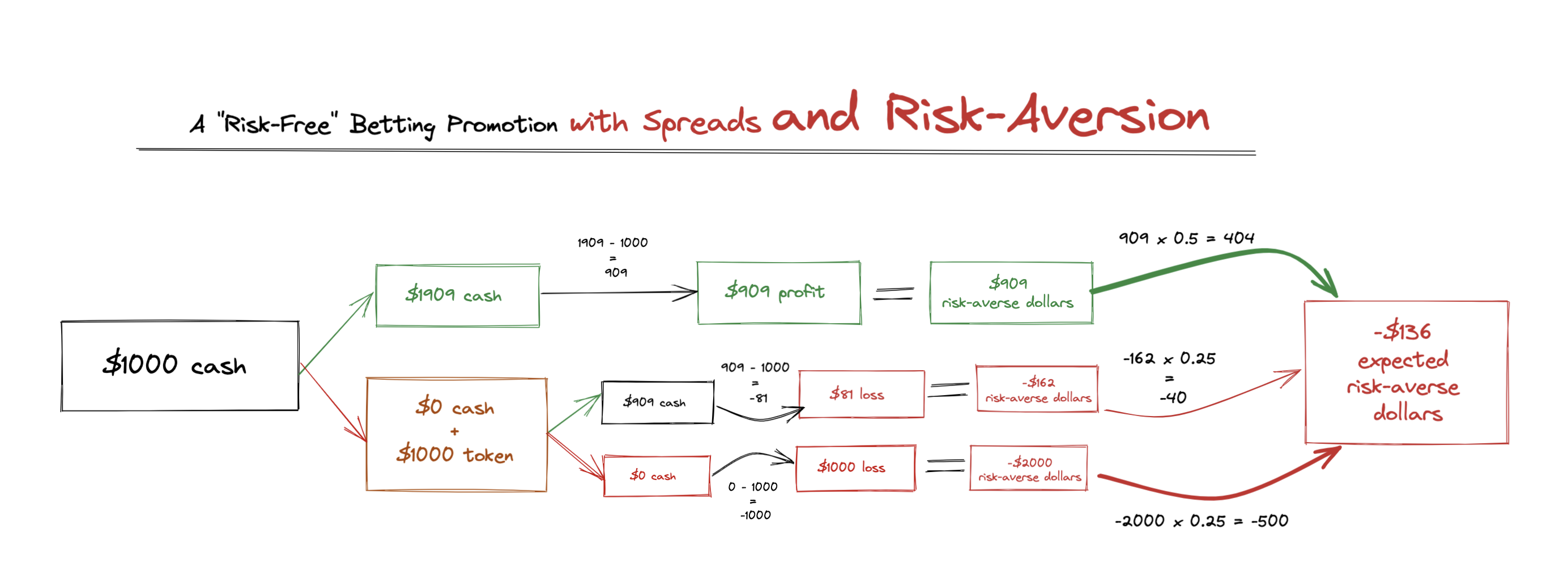
We are both going to feel silly if I keep writing, and you keep reading, phrases like "expected risk-averse dollars". Let's call them ERDs.
You could be forgiven for thinking: "An expected risk-averse dollar sounds exceptionally made-up, and giving them an acronym seems like a poor way to hide that. I cannot hold it or exchange it for a Snickers bar. Somebody is telling me that MGM's promotion is worth -136 ERD, but I care about how many dollars it's worth, and this isn't that. ERDs are like Canadian dollars: probably nice-sounding in theory, but no good to me in Kansas."
Ultimately though, we don't want dollars either: we want the goods and services we can exchange them for. Whether a piece of paper or a bank balance, a dollar is an abstraction that allows a baker to pay rent without leaving a mountain of sourdough at her landlord's door.
An ERD sounds suspicious, but it is just another abstraction. This time, instead of providing a common reference for valuing and exchanging different goods and services (the $ abstraction), ERDs provide a common reference for valuing and exchanging chances of winning or losing dollars. You may or may not care to do that! It is certainly a less normal thing to want to do than valuing and exchanging goods and services, but it does crop up, and nowhere more purely than gambling.
Normal commerce is conducted in a realm of certainty: my certain dollar for your certain apple. In the land of chance, there are no certain dollars: you deal in ERDs, or you are wandering the world with a wallet full of wholewheat, wondering why you keep getting fleeced. By revealing the MGM promotion to have negative value, ERDs keep us from taking a big risk for insufficient reward, and also suggests an alternative strategy.
The Power of Friendship - Going Both Sides of The Line
To briefly return to the Caesars deposit match promotion, I want to reintroduce Charlie. Beyond her cherished companionship and ability to drive us to the airport, having Charlie along was vitally important. Had either of us had gone to New York alone, there was a 50% chance of making no money, and being out the cost of the plane ticket and an Airbnb. If we go together, and agree beforehand to share our winnings, then we both have to lose in order to walk away with nothing - now only 25% likely.
We can, however, do better.
If 25% seems uncomfortably high, you can guarantee a profit by betting against each other. One of you will win (as long as you pick a bet with no ties, and only two teams (no golf, racing, etc.)) and you split the profit. This is known as "going either side of the line", and is explicitly banned in the Terms and Conditions on every single betting website (on pain of having your account frozen).
Vast numbers of bets are placed on these games every day: how does a site decide if two people are going either side of the line, and not just two fans of opposing teams? Every site enforces this slightly differently, but they probably use a mixture of the following clues.
Bets placed...
- ...at nearly the same time
- ...for the exact same amount
- ...by devices in similar locations (the same Wifi network, or possibly even same city block)
- ...from accounts created at similar times or in similar places
...may be flagged.
Consequently, consider a Thursday night Celtics vs. Heat game, 7pm tip-off. The week prior, two friends create their accounts on different days in different places. At 9:15am that morning, one places a $2993 bet on the Celtics from a coffee shop in Tribeca, and the other places a $3013 bet on the Heat from a Brooklyn subway station at 1:30pm. It would seem very, very hard for anyone to connect the two, within the thousands of other bets placed on the game.
The obvious concern is: If I pull this trick and they freeze my account, will I forfeit all the money I put in? The rough consensus is: probably not. In my short career, I've made ~30 eyebrow-raising bets, been flagged once, and had my money returned to me... though certain sites now void my account immediately after I sign up (I secretly take some pride in this). I've never heard of anyone who just lost their deposit, but maybe that's because those people are having their head kicked in under a Vegas parking lot. If you've heard differently, let me know!
Note that this strategy doesn't change your expected (remember, weighted-by-probability average) profit, which remains $3000 each: it just sacrifices the chance of making $6000 each in order to guarantee nobody goes home empty handed. Deposit matches don't care about risk-adjustment (if you can't lose money, there's no risk to adjust for), so this strategy doesn't yield more ERDs there either. It's in situations which do involve potential loss, like the MGM promotion, that the team-up strategy truly shines.
The committed gambler can now return to Mr. Fox with Charlie by her side, and turn the other shoe firmly onto a new table.
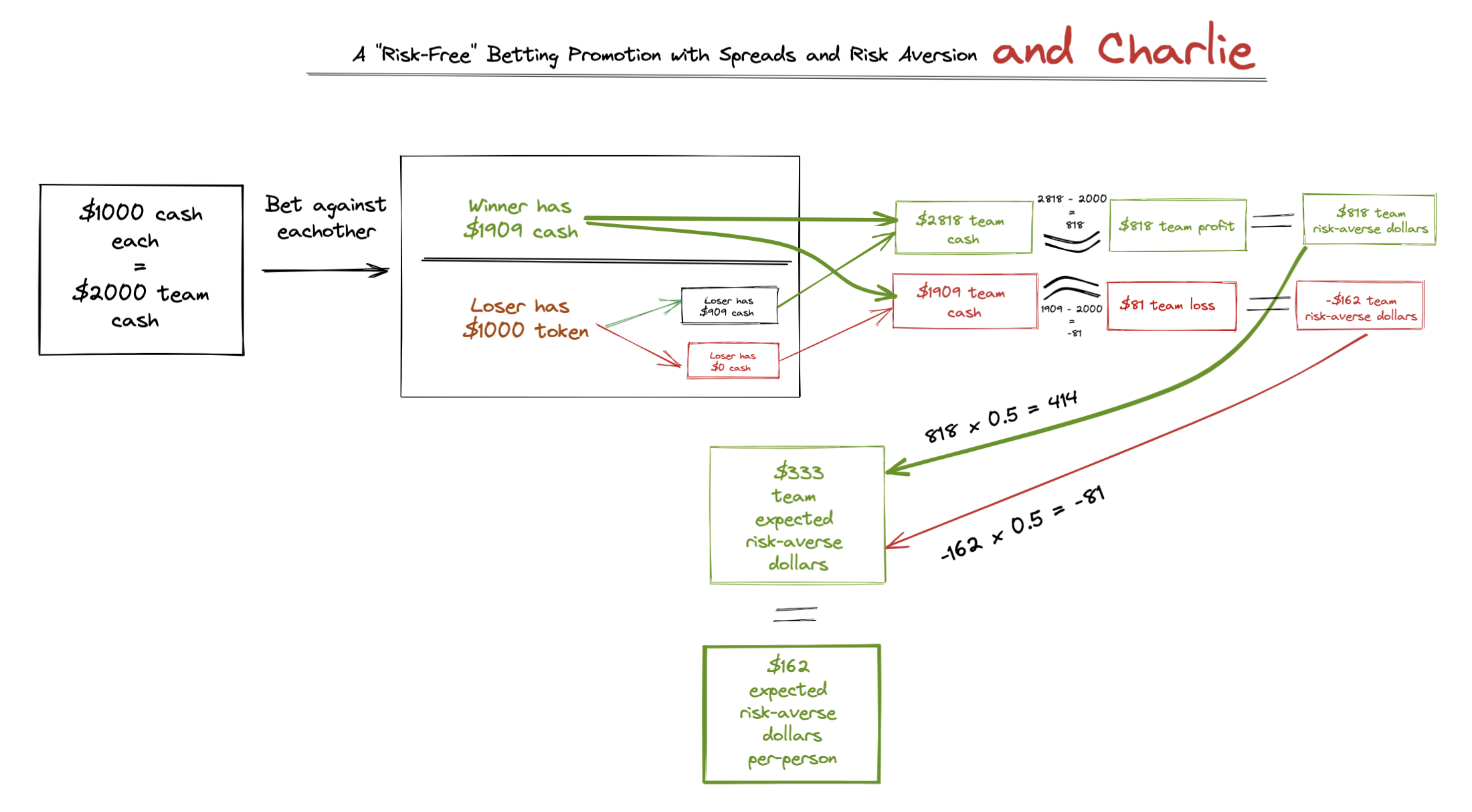
By judicious strategizing, we have converted a 136 ERD loss into a 162 ERD profit! If you just look at the two strategies in regular dollar terms, it is perhaps not obvious a) which is better, b) exactly how much better one is than the other, and c) if either is worthwhile; if we instead compare prices in ERD, these questions are immediately obvious! Don't try to pay rent with bread!
A Good Idea Is Worth Repeating...
And if you have a lot of friends, something magical happens...
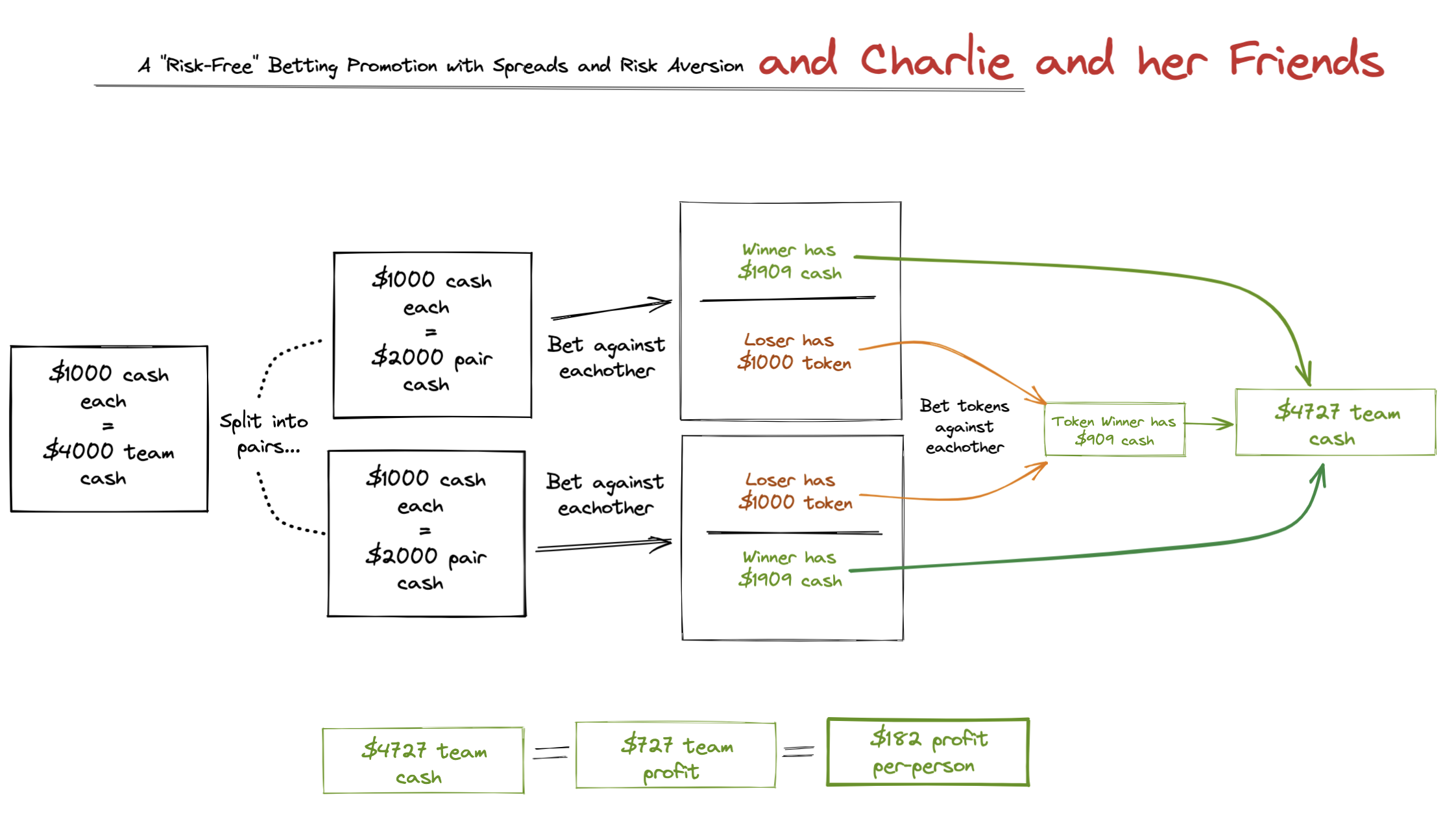
Note that we can now freely account in dollars or ERDs, because there is no longer any uncertainty. If four people pair off and bet as outlined, they will always make $182 each.
Unbalanced and Unbound
I was rather pleased with this strategy, and even moreso with my newly-found wealth and self-image as a digital Butch Cassidy. It was only a couple of months later, manically re-Googling "Best Sports Betting Promos 2022" and reflecting sadly on how much smaller $182 was than $1000, that I realised we'd left a lot of juice in this particular peach.
The value of a deposit match promotion comes the moment you put your money on the table, and it magically doubles. The value of a risk-free bet promotion comes when you lose, and you get a free-bet token instead of nothing. If you win, the risk-free bet promotion was kind of pointless: you profit the same as you would have without it. There's a weird asymmetry between the outcomes: somehow you sort of want to lose your bet in order to reap a benefit. This isn't quite right: if you lose your bet, you convert $1000 cash into a $1000 bet token, which is worse. You'd still prefer to win, but the promotion makes losing less bad.
We've mainly discussed even-money bets thus far, and I'd like to bring the simplest non-even bet into the picture: a favourite team with a two-thirds chance of winning, and an underdog with a one-third shot. You might also call this a 2:1 bet, or (ignoring spreads) using moneyline odds, (-200, +200).
The first thing to note is that the expected value of either side of this bet is 0, just as with an evens bet. The underdog bet is more likely to lose, and more lucrative when it wins.
The second observation is that the expected values of each side are not the same when using a free-bet token. If your $100 token wins on a +200 bet, you keep the $200 winnings; if it wins on a -200 bet, you walk away with only $50. It's twice as likely to happen, but you make one quarter as much. Because you don't get your stake back, a free-bet token is increasingly pointless as the winnings get smaller: they are much more powerful when used on less likely, more lucrative underdog bets.
Alone, these asymmetries are just interesting; combine them, and a symphony of opportunity emerges:
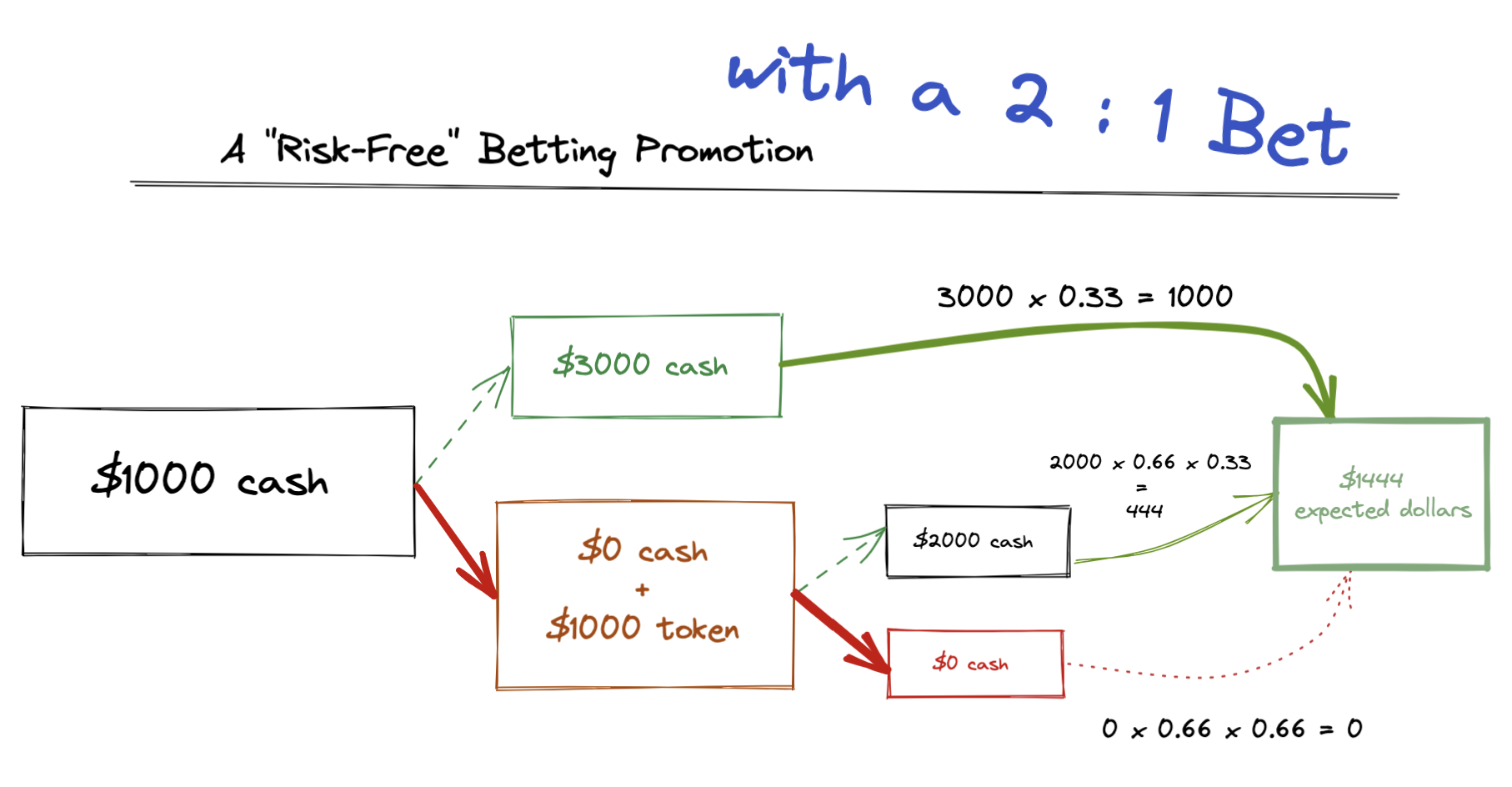
By abandoning even-money bets, we have created an extra $194 of expected value! The flip side: spreads are worse with higher odds, and it's now more likely that we'll lose both bets (25% -> 44%), so we're still deep in negative ERD territory.
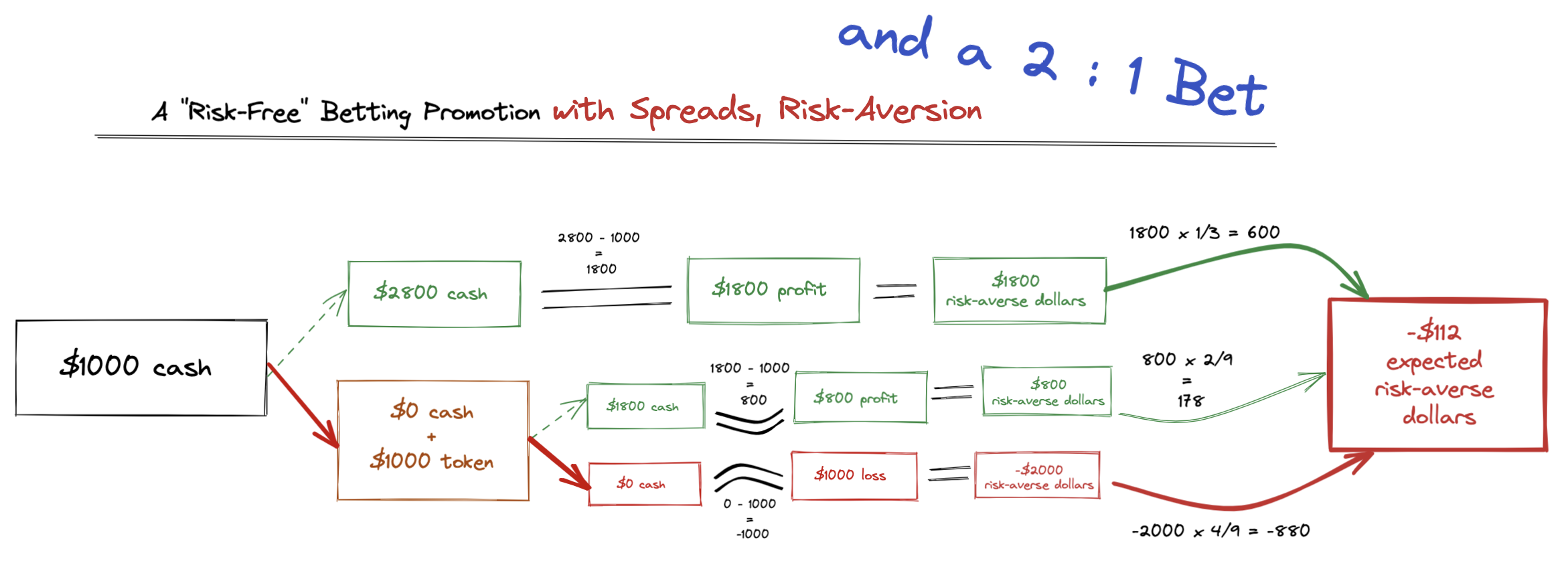
Just as before, though, we can remove this risk by pairing off with friends, but this time half the bets are on favourites, and so are probably going to win. These bets get comparatively little extra firepower from being "risk-free bets", so don't waste the promotion on them. You or a teammate can take the favourite bet from a different sportsbook - perhaps one where you have a deposit match, or already used your promotion.
Hungry for ERDs, and armed with this outline, there are a few dials you can turn in pursuit of glory and riches: whether a winning bet token returns its stake, your risk-premium, and the odds you select for the underdog in both your initial bet and your token bet (these need not be the same).
That's a lot to keep track of, so we'll have to abandon flowcharts in favour of a Jupyter notebook, which lets you explore each of these parameters to maximize your ERD harvest.
I've shown some of the notebook results below. These are visual representations of the profit landscape underlying the hedged, two-bet strategy we just developed. Each point in a chart represents a pair of moneyline odds (you can mouse over and take a look!). As we go right, our initial bet gets riskier (i.e. has higher moneyline odds); likewise going up, for the follow-up bet-token-bet if the first bet's a loser.
Points in red represent pairs of odds that produce negative ERDs (and are thus a bad idea); points in blue represent pairs that produce positive ERDs. I've also switched from representing absolute profit to percentage profit, because different promotions have different limits, you might not have $1000 lying around, etc: the takeaway is no longer "You will make 250 ERD", but rather "This strategy yields a 31% profit, so if you wager $1000 on the promotion, you'll make 310 ERD; if you wager $500, you'll make 155 ERD, etc."
These charts account for spreads: in fact I've been particularly conservative in my calculations, using the worst spread I could find for a given moneyline. As such, these profits are almost certainly an underestimate.
If the giant red-blue squares look imposing, fear not: we'll walk through an example.
What Is My Profit When...
(Losses And Gains Treated Equally)
(Normal)
(Any Loss is Unacceptable)
So far we've been living in the first row, middle chart: a normal risk aversion, with a bet token that doesn't return its stake if it wins. The 2:1 bet we just examined would have moneyline odds of (-200, +200), though with spreads it's more like (-220, +180): we receive less money than we should, given the win probability.
To recap, the strategy we diagrammed was:
- Find a game with odds (-220, +180) between Favourite 1 and Underdog 1
- Use your promotion to bet on Underdog 1 at +180, while betting elsewhere on Favourite 1 at -220.
- If Underdog 1 wins, celebrate!
- If it loses, find another game with odds (-220, +180) between Favourite 2 and Underdog 2.
- Take the bet token you received from the promotional bet losing and place that on Underdog 2 at +180, while betting elsewhere on Favourite 2 at -220.
This strategy is completely captured by the single point (+180, +180), which happily falls in the blue zone and tells us we'll reap a 19.3% ERD profit. If we max out the MGM promotion, that's 193 ERD. Not bad, but if we nudge over to (+140, +200) we can reach the heady heights of 263 ERD: almost 40% better!
These plots range from -700 to +700 on each axis, which covers most head-to-head games you'll come across (at least before they start; the halftime odds of UNC blowing a 16-point lead are plus-many-thousands...). You won't always find a game with the exact optimum odds, but the charts will guide you as close to the mountain peak as the day's schedule allows.
Some broader observations:
- Look how much more red (expected risk-adjusted loss) there is than blue (expected risk-adjusted profit). Ours is a dangerous world: even if you were weirdly risk non-averse (top left chart), you'd expect to lose money on two-thirds of your bets even with this supposedly lucrative promotion. This hopefully illustrates the benefit of pinning these numbers down; most bets you could make are not only non-optimal, they are actively bad!
- The "I Will Die If I Lose Money" charts on the right have smaller, but still real, blue zones. It will be harder to find a game there, and the payoff will be slightly worse, but you cannot lose money.
- The second row is much bluer than the first. Promotions (most famously Barstool and FanDuel) where a winning Bet Token also returns its stake are roughly twice as valuable.
- The importance of risk-adjustment is particularly clear when you look at the same point across charts. The optimal odds from the top left chart (+260, +370) give a 34.1% risk-unadjusted profit, but one chart over (moving the Risk Premium from 1 to 2), the very same point has a risk-adjusted profit of 1.5%: almost pointless.
- Two charts over, the risk-adjusted profit is negative one-bajillion percent: where there's a non-zero chance of losing any money, the huge risk-adjustment drops you to oblivion.
Choose whichever chart best describes your situation, and set sail for the Isle of Blue Money!
How to Make $800 Risk-Free Right Now
These promotions may have changed since Aug 27th 2022 - look for the 'Promotions' tab on each site for details
At press time, in most states, BetRivers' $250 deposit match and Barstool's $1000 risk-free bet whose bet token returns its stake (and thus is twice as valuable as a normal risk-free bet promotion) are the best options for the time-constrained hustler.
- Sign up for BetRivers, enter the match code on the deposit page, and deposit $750, giving you $1000 in the account.
- Sign up for Barstool, confirm that their $1000 risk-free promotion is still active, and deposit $1000.
- Look on Barstool for a bet around +270, where there are only two outcomes, and no possibility of a voided bet (i.e. 'Over 4 / Under 4', which voids when a team wins by exactly 4).
- Bet $1000 on the favourite at BetRivers (at around -310 odds), and $1000 on the +270 underdog at Barstool. Note that the odds offered on the two sites won't be exactly the same; aim for a bet that minimizes the overall spread between your favourite and your underdog. Spreads here are around 40, and the lower the better: prefer a spread of 30 (+260 Barstool, -290 BetRivers) to a spread of 50 (+270 Barstool, -320 BetRivers).
- Cheer on the underdog!
- If you locked in at (+270, -310), and the underdog wins...
- You net $2700 - $750 = $1950. Celebrate!
- If the favourite wins...
- You have $1320 at BetRivers, and a $1000 site credit at Barstool.
- Find an even-money bet (about -110 odds on either side), and put the $1000 Barstool site credit against $1000 at BetRivers.
- If BetRivers wins...
- You now have $2229 at BetRivers, after total deposits of $750 + $1000 = $1750, for a $479 profit.
- If Barstool wins...
- You still have $320 at BetRivers, and $1909 at Barstool, for a total of $2229: also a $479 profit.
You have a 25% shot at $1950 jackpot, and a 75% consolation prize of $479, for an expected profit of $846. Feel free to dial the underdog odds down slightly for a better chance at a smaller jackpot.
The astute reader will note that the optimal odds in this scenario would have been (+370, -100), the payoff where we landed, (+270, -110), was only ~2% smaller, and the accounting is easier. Feel free to freestyle and scoop up those final crumbs.
Common Pitfalls
- Getting held up by account validation, being asked for a utility bill, etc. This happens before you deposit any money, so you don't lose anything, but can be anywhere between annoying and impossible to resolve.
- Forgetting to enter a promotion code, or to opt-in to a promotion on the site (sometimes there is no opt-in required, but never assume).
- Not realising that you enter some codes when you deposit, rather than when you sign up.
- Betting on a voidable outcome (i.e. 'Over 4 / Under 4', which voids when a team wins by exactly 4) and wasting a free bet.
- Confusing a 'free bet' that does not return its stake with 'site cash' / 'site credit' that does... everyone uses different terminology here, but if you look closely, the promotion terms will specify.
- Trying to do this with online casinos. They all have big deposit matches, but ridiculous playthrough requirements (25x, etc.), and it is functionally impossible to recover any money.
Into The Wild
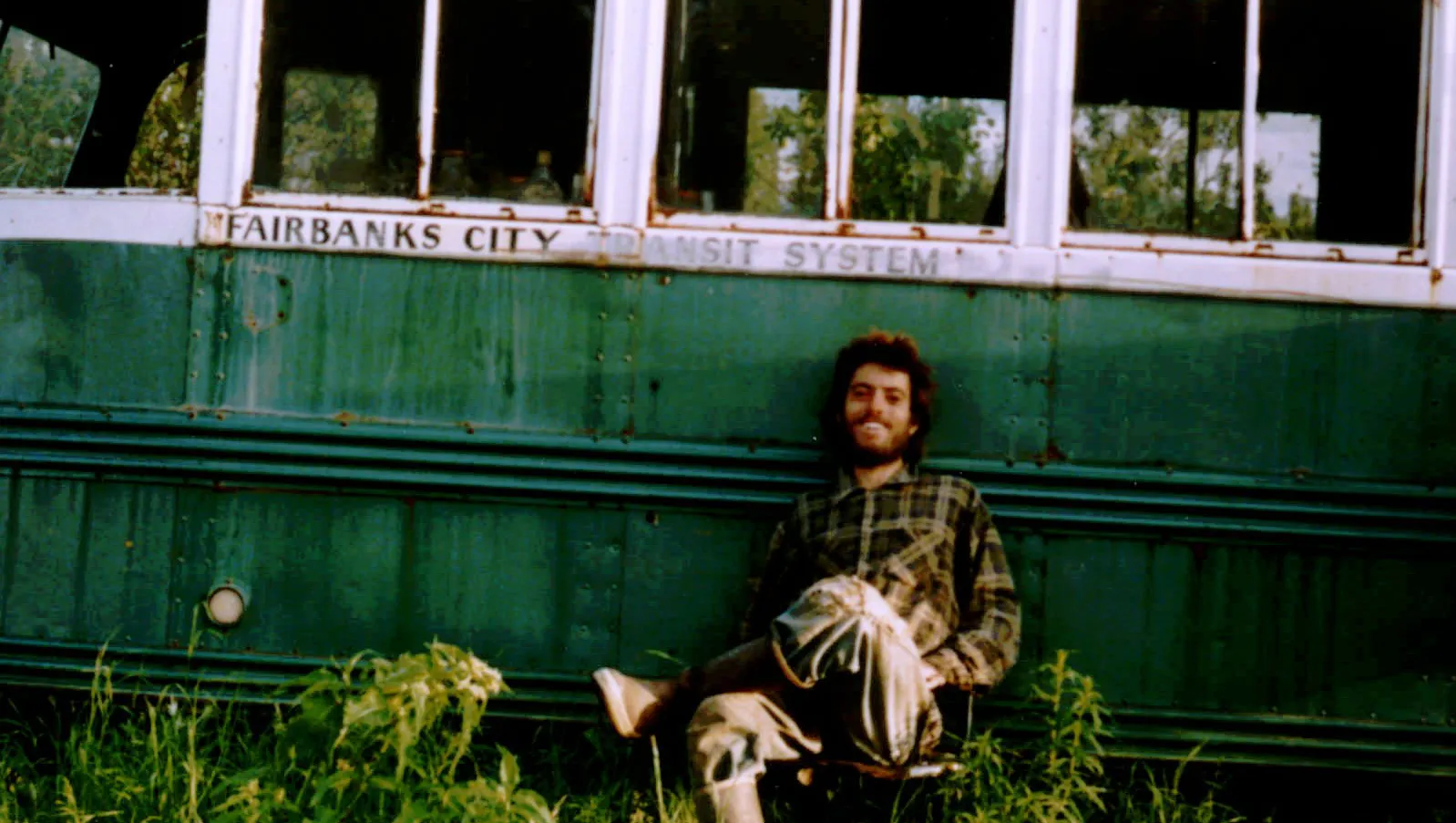
(Chris McCandless, after hitchhiking across the country to acquire every sign-up bonus in America)
Once you understand the rules, the jargon, and have chosen your strategy, the last and highest hurdle is to work up the energy and head a-hunting. Promotions rotate, state regulations change, new companies acquire licenses. "Best Sports Betting Promos" returns pages of lists. Some sites are unbelievable, both in the sense of offering massive sign-up bonuses, and in requiring all deposits to be made in crypto to their Albanian headquarters: these I leave to braver prospectors.
Others have uncomfortably high play-through requirements: sure, they'll match your $1000 deposit, but you have to make total wagers of $5000 to unlock your bonus. The teamwork trick breaks down, because after wagering $1000 against each other, the loser has no money left, and still needs to wager 4000 extra dollars to unlock their bonus cash.
Many sportsbooks are only in their local state, but the big ones (Caesars, MGM, FanDuel, and Barstool) are most everywhere that's legalized. Caesars and BetRivers require a new account in each state, which means you can re-run their bonuses whenever you visit a new state; Danville, Virginia is barely a mile from the North Carolina border: their McDonald's has excellent Wifi, and opens early.
My Year 10 maths teacher's deepest fear was that his students might one day desecrate the pleasure of pure mathematics by applying it to something. If Mr Rowland is reading this: I apologize profusely.
To everyone else, I hope this has been both mildly educational and financially fruitful. Reading is easy, but I really encourage you to actually try this, even with $50 if you don't feel comfortable going to the limit. Good luck!

P.S.
Several sites also offer referral bonuses that kick back ~$50 to both sides, making team-ups even more valuable (I am happy to refer anybody flying solo, or teams who all want the referral bonus).
Once you've signed up everywhere possible, the ride is largely over, but it's worth keeping the various apps in your phone. Every few months some poor marketing manager with user-engagement metrics to meet spies my inactive account, and a notification pops up on my phone for a one-time $200 deposit match to lure me back. When a baby offers you candy...
Always happy to field questions or correct errors: reach me here.